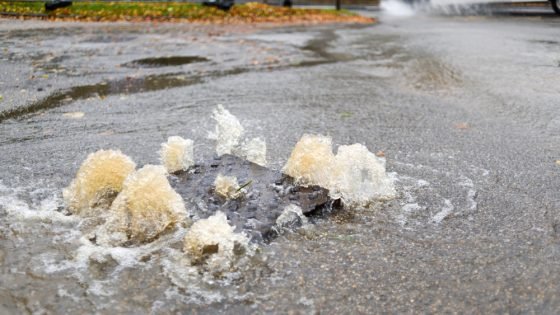£180M investment ‘fast-tracked’ by government to prevent sewage spills

AI systems to manage storm loads, thousands of new in-sewer monitors, new staff and accelerated wetland construction programmes will receive investment over the next 12 months according to a government announcement.
The move by the government to invest £180M over the next 12 months follows the existing £3.1bn commitment from water companies to invest in storm overflow improvements for the current price review period (2020-2025).
Thames Water, Wessex Water and Southern Water came under severe criticism in the latter half of 2023 when they were found to be discharging sewage into waterways during heatwaves when waterbodies are least able to absorb the impact of pollution.
The government said it hoped the new investment would prevent 8000 sewage spills into English waterways.
It said news follows the Environment Secretary’s previous demand in December 2023 to water and sewage companies to reduce sewage spills over the next 12 months.
The £180M will be delivered by April 2025 and supports the targets under the government’s storm overflows discharge reduction plan which the government said, “is driving the largest infrastructure investment in water company history, estimated at £60 billion over the next 25 years.”
A statement from the government said the new investment “follows the recent ban on bonuses for water company executives where firms have committed serious criminal breaches, subject to Ofwat consultation, and the quadrupling of the Environment Agency’s regulatory capacity, enabling them to carry out 4,000 water company inspections by the end of the next financial year.”
Arcadis senior director for resilient cities and UK climate adaption lead and ICE president Anusha Shah said: “The news of significant investment to fast-track sewage spills is welcome.”
Shah warned about the failure to look at the problem “at a holistic, catchment level.”
“We need to fully embrace blue-green, nature-based solutions (wetlands, ponds, land use planning, etc) and make them an integral part of the engineered solutions.
“It’s time we think creatively and innovatively on solving problems.
She said “Whilst a concrete storm tank may solve the problem where it occurs, a nature first approach or a blended green and grey approach, such as a wetland can not only help filter organic and inorganic pollutants but also provide multiple ecosystem services and benefits, including health and wellbeing and flood resilience for communities.”
Arcadis cities director Peter Hogg said: “Who wouldn’t like to see an extra £180M spent on measures to reduce sewerage spills?
“We should perhaps temper the excitement a little however, as this is an uplift of just under 6% on the £3.1bn already committed to be spent by 2025.
“The value in this additional spending will be judged by how quickly and effectively it can be deployed; and by the extent to which it is spent on solutions that genuinely get to the root cause of the issue, rather than slapping a band-aid on the result.”
Hogg said the commitment to invest in technology was “interesting” and said “at Arcadis we strongly champion the use of technology and intelligence to deliver a planet-positive future.
“We hope that at least some of the £180M will be used for groundbreaking and recyclable solutions that speak to the future, not the past.”
A Water UK spokesperson said: “This investment is a head start on the most ambitious plan to improve storm overflows in the world with English water and sewerage companies proposing to invest £10.2 billion by 2030.
“The plan, if approved by the regulator Ofwat, will prevent more than 150,000 sewage spills with full details being announced later this week.”
The Wildlife Trusts water policy manager Ali Morse said: “Government asked water companies to identify short-term solutions that could start to reduce spills whilst more substantial long-term fixes are being implemented.
“As a result, companies have come forward with fast-tracked investment that will reduce spills at priority sites such as chalk streams and Special Areas of Conservation, easing the pressures on nature.
“However, the overall programme to reduce spills will run to 2050 and, on the whole, will be costly and carbon-heavy, relying on engineered solutions. Instead, nature-based solutions such as wetlands and other sustainable drainage systems need to become more central to the programme.”
Morse said nature-based solutions “help trap rainwater and keep it out of the sewers in the first place, helping to tackle sewage spills in a low-cost and low-carbon way whilst also benefiting nature.
“Without these, we risk an expensive and slow programme of upgrades that draws attention away from other urgent investment required across the sector, such as around water supply and drought resilience,” Morse warned.
Surfers Against Sewage CEO Giles Bristow said: “Is it possible to claim you’re fast-tracking action on a decades-old issue?
“What’s clear from this announcement is that the voices of constituents across the UK are clearly making those in power listen and take visible actions to address the sewage scandal.
“The number of spills this announcement boasts it’ll prevent are mere chicken feed in the deluge of pollution flooding our rivers and seas, and so it’s clear questions still remain on the scale and scope of the government’s ambitions for ending the sewage scandal.”
Environment Secretary Steve Barclay said: “The amount of sewage being spilled into our rivers is completely unacceptable and the public rightly expects action.
“This £180 million of accelerated investment, which will stop more than 8,000 sewage spills over the next year, is a welcome step forward as we continue to push for better performance from water companies and hold them to account.
“This money will mean more cutting-edge technology, including artificial intelligence, and more specialist staff to detect and reduce spills.
“Today’s announcement builds on significant work by this government to protect and strengthen our waters with increased investment, stronger regulation and tougher enforcement action.”
Like what you’ve read? To receive New Civil Engineer’s daily and weekly newsletters click here.
Source link





